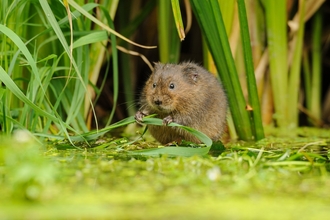The funding is part of a wider £2.5m fund made up of National Lottery Funding and local funding made available for the ‘Colne Valley – a landscape of the edge’ partnership that brings together wildlife organisations, local authorities, and water companies, led by community charity Groundwork South. The Trust has developed a Rivers & Wetlands Project which includes conserving water voles and managing the many fisheries across the Colne Valley for conservation.
Earlier this year a new analysis of data collected over ten years by a network of experts led by The Wildlife Trusts revealed that water vole distribution has declined dramatically. There has been a 30% decline in the places where these river mammals once lived across England and Wales during the survey period 2006 - 2015.* Water Voles are now restricted to one area in the Colne Valley – Frays Farm Meadows west of Uxbridge. Over the past three years, the Trust has been successful in securing funding to conserve this population through survey, planning and then habitat enhancement. The work has also meant that local water voles have increased their range. The new funding will enable to Trust to survey the wider Colne Valley, identify priorities for habitat enhancement, carry out enhancement work and at the same time increase and maintain control of North American mink, the primary predator of water voles.
There is another population of water voles in the Chess Valley, a tributary of the Colne which joins at Rickmansworth. The Trust hopes to link up the two populations using additional funding from the HS2 Additional Mitigation Plan (AMP).
The Trust’s project also aims to achieve integrated management of the many fisheries across the Colne Valley. The valley has over 70 separate water bodies, covering over 400 hectares, most of which are fished by private angling clubs. The project will balance satisfying angling opportunities while conserving and increasing biodiversity to effect landscape-scale nature conservation in the Colne. Training will be given in fisheries management, wetland ecology, management planning and managing change. As part of the training, volunteers will then contribute to the preparation of management plans for their fisheries.
The two projects will be managed by a new Rivers and Wetlands Project Officer fully funded through the HLF project and based within the Trust’s Living Landscapes team.

